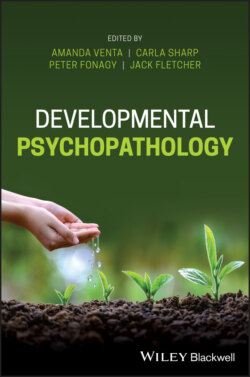Читать книгу Developmental Psychopathology - Группа авторов - Страница 119
Social cognition
ОглавлениеOur early attachment relations shape the way that we see, remember, and interact with the social world later on. For instance, studies have shown that securely attached adolescents attend to positive feedback about the self and seek it out from non‐attachment related targets (Cassidy, Ziv, Mehta, & Feeney, 2003); perceive attachment experiences and memories more favorably (Dykas, Woodhouse, Ehrlich, & Cassidy, 2010); and report more prosocial social‐information processing (Granot & Mayseless, 2012). In contrast, insecure adolescents process social information in a negatively biased way (Dykas, Cassidy, & Woodhouse, 2009).
Attentive caregivers are likely to treat their children as psychological agents, implicitly guiding the child to develop mental state reasoning abilities (Fonagy & Allison, 2012). For securely attached children, this process results in accurate social cognition, or reasoning about others’ underlying mental states (Dykas & Cassidy, 2011). This relation is evident into adolescence and beyond. For instance, Hünefeldt, Laghi, Ortu, and Belardinelli (2013) reported that attachment anxiety was associated with less accurate identification of mental states in the eyes of others. Likewise, attachment security has been associated with more frequent and more accurate social cognition (Ammaniti et al., 1999). Among adolescents with psychiatric diagnosis, Sharp and colleagues (2016) tied over‐attribution of mental states to decreased attachment security, and Venta and Sharp (2015) documented associations between attachment disorganization and poor social cognition.
